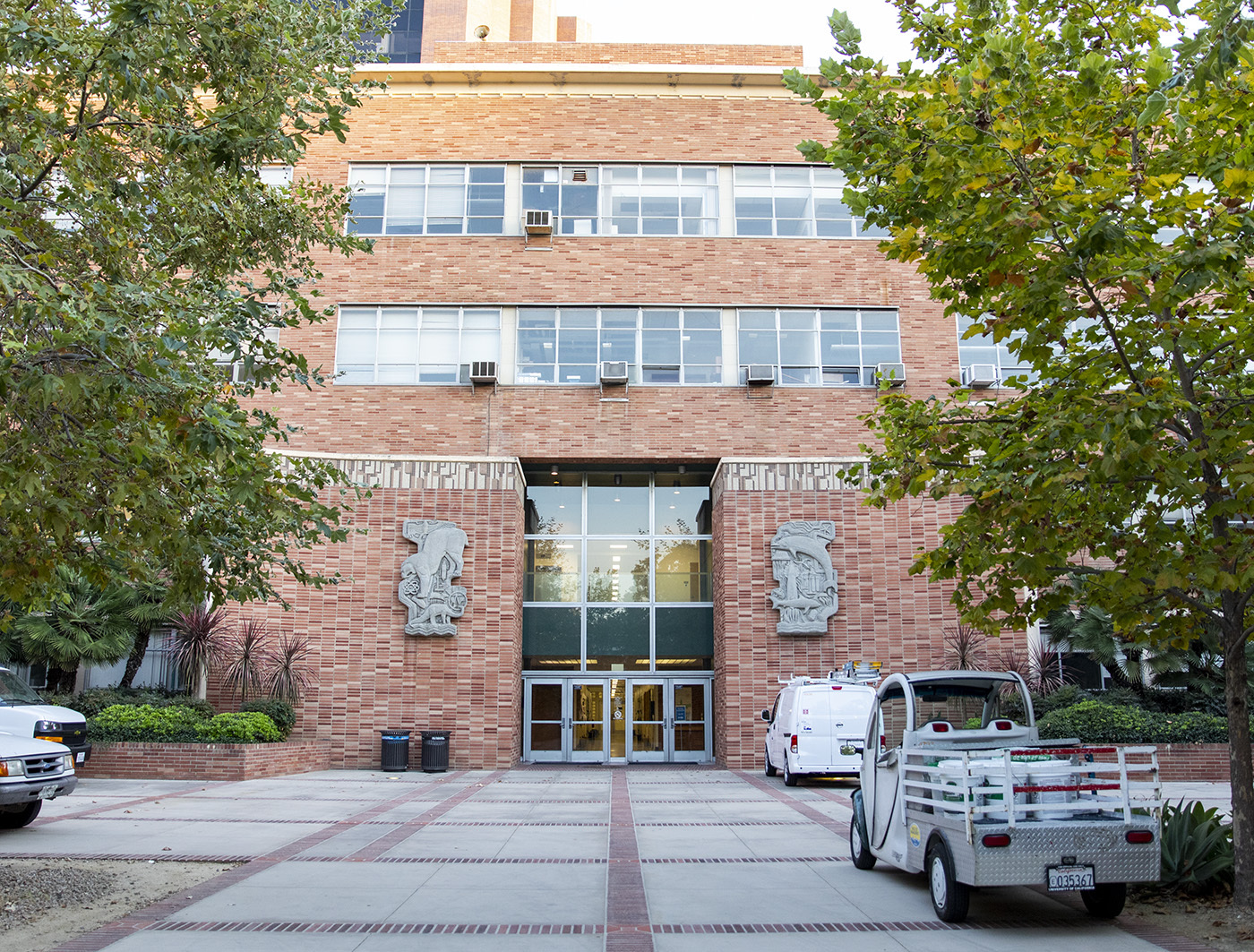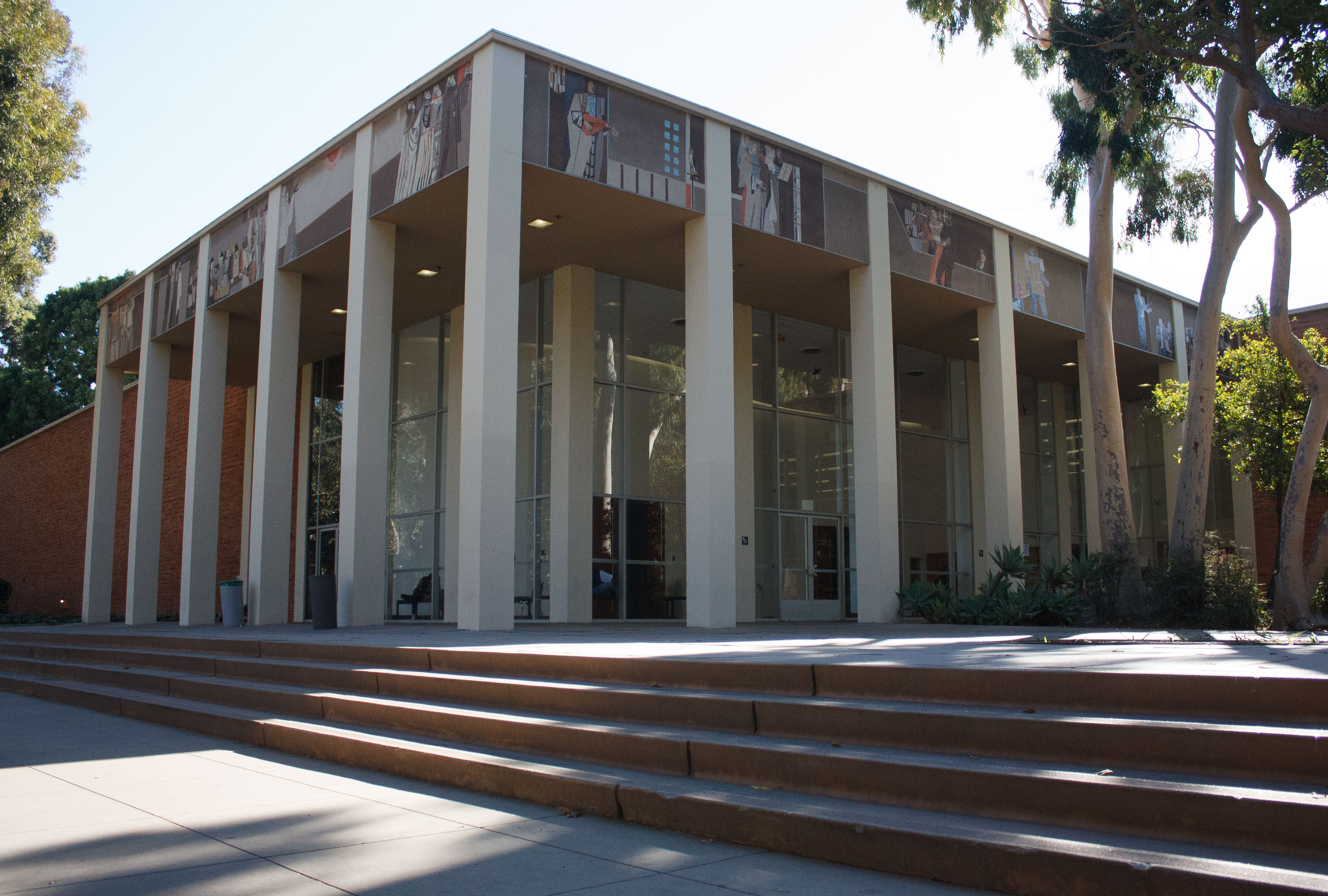Opinion: UCLA needs an undergraduate business major to increase choice, job market options

The UCLA Anderson School of Management building is pictured. UCLA must create an undergraduate business major to increase opportunities for students entering the job market, argues Tavian Williams. (Daily Bruin file photo)

By Tavian Williams
April 25, 2024 7:39 p.m.
UCLA has long been known for its top-ranked programs in medicine, law and engineering.
However, there is one field of study that has been notably absent at the university: undergraduate business. Although business is one of the most popular majors among college students nationwide, UCLA has yet to establish a formal program.
This significant gap in the university’s academic offerings should not be neglected. Rather, UCLA ought to provide students with the skills and knowledge necessary to succeed in today’s rapidly changing business world.
Historically, the need to accommodate the influx of students has played a crucial role in shaping California’s higher education system, influencing the areas of study offered by public universities.
During the 1950s and 1960s, our country underwent significant changes, including the Civil Rights Movement, the Space Race and the Cold War. With modern technology on the rise, division of labor became necessary to provide specialized education to some college students while others were given practical training.
As a result, the University of California system was structured to be a beacon of innovation in research and scholarship with the establishment of the Master Plan for Higher Education in California in 1960. The UC schools became the state’s primary research institutions where students were educated in areas of academia and theory, with the opportunity to earn doctoral and professional degrees.
Anything outside of that criteria was designated to the California State University or the California community college system. Both focus on teaching students hands-on trades and practical occupations like journalism, agriculture, engineering and business administration.
While there are exceptions, this 60-year-old legislation is one of many reasons why UCLA does not have an undergraduate-level business major.
Over the years, UCLA has produced generations of enlightened scholars who are versed in theory and research, which is needed to continue innovation. Business is just as necessary although it is viewed as practical.
A business degree is applicable in a myriad of fields, whether students want to become entrepreneurs, bankers, accountants, consultants or marketers. Its foundation is versatile, allowing graduates to stand out in the job market and succeed.
Business, like computer science and nursing – which are both offered at UCLA – is one of the most in-demand degrees, according to Crimson Education.
Studying business at UCLA would add prestige and marketability to the degree and give students autonomy to take an eclectic selection of courses in the business sphere rather than the one-size-fits-all model the university currently offers.
At the moment, the factor of choice is limited.
Since UCLA does not have a business degree, students have slim pickings when choosing a major, with most resorting to economics. The two fields merged into one major go hand in hand, but unlike business, economics can be researched from an academic standpoint.
Forest Gong, a second-year business economics student who is the co-founder and community outreach director of the Bruin Finance Society, said he prefers the intricacies of economics, believing that business has a more practical application.
“Economics is a stronger foundation from which you can build on into more complex roles, such as a financial analyst for a company, in which you would need to understand economics and then build upon specific skills in that certain industry in order to be successful,” Gong said.
Economics is a sound major. Crimson Education lists economics as an in-demand degree as well, but to many Bruins, it falls short of being a perfect substitute for a business degree at UCLA.
“Economics is not a business major, and I think UCLA does that on purpose because there is no business major,” said Kate Larsen, a second-year business economics student. “I think the name of business economics is a bit misleading because really, it’s just economics and then a couple management courses, which even the title ‘management’ is misleading because it’s literally just accounting.”
While economics is highly regarded and applicable in many business industries like investment banking, some students may face difficulty in job security when entering other industries like accounting or management because some facets of economics do not apply in the actual workplace.
I experienced this firsthand. Last summer, I applied for a supply chain internship. During the interview stage, my interviewers were apprehensive about my qualifications due to my business economics major. I had to prove that my skills were applicable through my collegiate experiences, further emphasizing the value of obtaining a business degree for an easier transition in the job market.
At UCLA, business economics and economics are impacted majors, having a high demand for entry, but a scarcity of spots since the department is over capacity.
The majors are notorious for their “weeder” classes, such as Economics 11, 41, 101 and 102, which act as solutions to the surplus problem. But as a result, it gatekeeps some students from getting into the sole business-adjacent major. As a result, the economics department has an unconstrained monopoly of power, even if it doesn’t intend to.
Although business economics is considered a Bachelor of Arts, the department classifies it as a STEM major. The curriculum’s subject matter is embedded in mathematical concepts like single and multivariable calculus, probability, algebra and statistics.
Implementing an undergraduate business program will allow for the allocation of students from the economics department, making the major less impacted and providing many with the elasticity of choice they currently lack.
At other UC campuses with a business economics curriculum like UC San Diego, the program is divided into half business and half economics classes. The major is also considered a Bachelor of Science and a collaborative program between the graduate business school and the Department of Economics at UCSD.
UC Berkeley, UC Irvine and UC Riverside all have accredited undergraduate business programs, alluding to the exceptions in the research-focused UC system, along with the University of Michigan, a fellow public research university, and USC.
Yassen Abdelfatah, a fourth-year business administration student at the UC Berkeley Haas School of Business, said admissions counselors from Ivy League Masters of Business Administration programs and notable companies – such as Ernst & Young and Deloitte – often visit Haas students to assist them with finding post-graduation opportunities.
“A lot of companies come out and set up tents on campus. And you can literally network right then and there getting out of class,” Abdelfatah said.
Abdelfatah was accepted into UCLA’s business economics program but chose to attend Berkeley because they had Haas.
While UCLA has a business school, the John E. Anderson School of Management is solely a graduate school for students pursuing a master’s or doctoral degree.
Los Angeles is a global metropolis where business transactions are the heartbeat of wealth and where networking is king, thus creating strong reasons to establish an undergraduate business major at UCLA.
However, several barriers currently prevent the establishment of an undergraduate program.
In an emailed statement from Chancellor Gene Block, he said start-up costs for the endeavor would be substantial and UCLA would need to get approval from the UC Academic Senate.
“The Senate committee would attempt to determine whether there is need/justification for an additional undergraduate business school in the UC,” Block said in the emailed statement. “We established a School of Music about a decade ago – it was a very long process – but certainly possible.”
Block added that the estimated cost to start an undergraduate business program would be in the hundreds of millions of dollars. This would pay for the costs of the infrastructure to build a facility and accommodate a large number of students, recruitment costs, staff and faculty salaries, building upkeep and an endowment.
At the moment, only considerable philanthropic donations would be able to cover these costs, not including the intricate process of gaining approval from the UC Academic Senate.
“Clearly, if we were going to create an undergraduate business school, it would have been easier had we accomplished this when the costs of construction, faculty recruitment, etc., were not as high as they are now,” Block added.
Although these current circumstances leave some students hoping to study business disillusioned, Anderson is working to create additional business-oriented minors to give students a chance to engage with concepts.
“In January, we announced that we are currently pursuing UCLA approval of our third undergraduate minor – in sports management,” said Antonio Bernardo, the Dean of Anderson, in an emailed statement. “In addition, we are currently exploring proposals for two more undergraduate minors – in real estate and in health care management, each of which would build on areas of Anderson and UCLA strength.”
Students can also take advantage of joining a business-centered club like the Bruin Finance Society.
Charlie Kratus, a first-year business economics student and host of the Instagram account Good Morning UCLA, said, “Business clubs really fill in some of the gaps that you could be missing in terms of networking and financial modeling and making the school seem a little bit smaller.”
Although UCLA does not have an undergraduate business program, this does not entirely hinder students’ opportunities for success.
UCLA has underutilized resources – like Handshake and the Career Center – to help students find business-related opportunities, whether it be internships or jobs post-graduation.
The university’s focus on interdisciplinary studies and its kindred ties to the LA and global business communities provide a unique and valuable experience that can help students achieve their career goals and make a meaningful impact in the business world.





